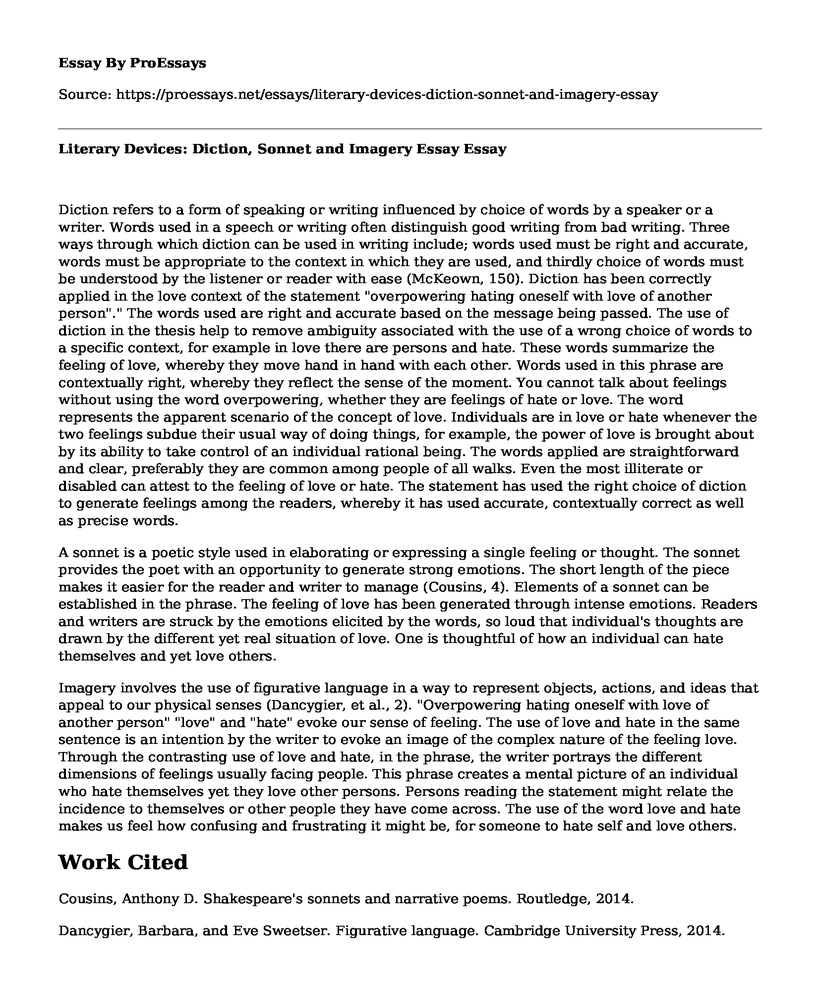Diction refers to a form of speaking or writing influenced by choice of words by a speaker or a writer. Words used in a speech or writing often distinguish good writing from bad writing. Three ways through which diction can be used in writing include; words used must be right and accurate, words must be appropriate to the context in which they are used, and thirdly choice of words must be understood by the listener or reader with ease (McKeown, 150). Diction has been correctly applied in the love context of the statement "overpowering hating oneself with love of another person"." The words used are right and accurate based on the message being passed. The use of diction in the thesis help to remove ambiguity associated with the use of a wrong choice of words to a specific context, for example in love there are persons and hate. These words summarize the feeling of love, whereby they move hand in hand with each other. Words used in this phrase are contextually right, whereby they reflect the sense of the moment. You cannot talk about feelings without using the word overpowering, whether they are feelings of hate or love. The word represents the apparent scenario of the concept of love. Individuals are in love or hate whenever the two feelings subdue their usual way of doing things, for example, the power of love is brought about by its ability to take control of an individual rational being. The words applied are straightforward and clear, preferably they are common among people of all walks. Even the most illiterate or disabled can attest to the feeling of love or hate. The statement has used the right choice of diction to generate feelings among the readers, whereby it has used accurate, contextually correct as well as precise words.
A sonnet is a poetic style used in elaborating or expressing a single feeling or thought. The sonnet provides the poet with an opportunity to generate strong emotions. The short length of the piece makes it easier for the reader and writer to manage (Cousins, 4). Elements of a sonnet can be established in the phrase. The feeling of love has been generated through intense emotions. Readers and writers are struck by the emotions elicited by the words, so loud that individual's thoughts are drawn by the different yet real situation of love. One is thoughtful of how an individual can hate themselves and yet love others.
Imagery involves the use of figurative language in a way to represent objects, actions, and ideas that appeal to our physical senses (Dancygier, et al., 2). "Overpowering hating oneself with love of another person" "love" and "hate" evoke our sense of feeling. The use of love and hate in the same sentence is an intention by the writer to evoke an image of the complex nature of the feeling love. Through the contrasting use of love and hate, in the phrase, the writer portrays the different dimensions of feelings usually facing people. This phrase creates a mental picture of an individual who hate themselves yet they love other persons. Persons reading the statement might relate the incidence to themselves or other people they have come across. The use of the word love and hate makes us feel how confusing and frustrating it might be, for someone to hate self and love others.
Work Cited
Cousins, Anthony D. Shakespeare's sonnets and narrative poems. Routledge, 2014.
Dancygier, Barbara, and Eve Sweetser. Figurative language. Cambridge University Press, 2014.
McKeown, Margaret G. "Learning word meanings from definitions: Problems and potential." The psychology of word meanings. Psychology Press, 2013. 149-168.
Cite this page
Literary Devices: Diction, Sonnet and Imagery Essay. (2022, Apr 14). Retrieved from https://proessays.net/essays/literary-devices-diction-sonnet-and-imagery-essay
If you are the original author of this essay and no longer wish to have it published on the ProEssays website, please click below to request its removal:
- Research Paper Example on The Yellow Wallpapers by Charlotte Perkins
- Poetry Essay Example
- Nighttime Fires and Snapping Beans Essay Example
- Essay Example on Watchmen: Who Is the Hero According to Alan Moore?
- Allegory of the Cave: The Light Versus the Darkness
- Descriptive Writing: Creating Visual Concepts for Poetry & Fiction - Essay Sample
- Essay Example on Neverhome: Exploring Power Through Dispositional Characteristics







